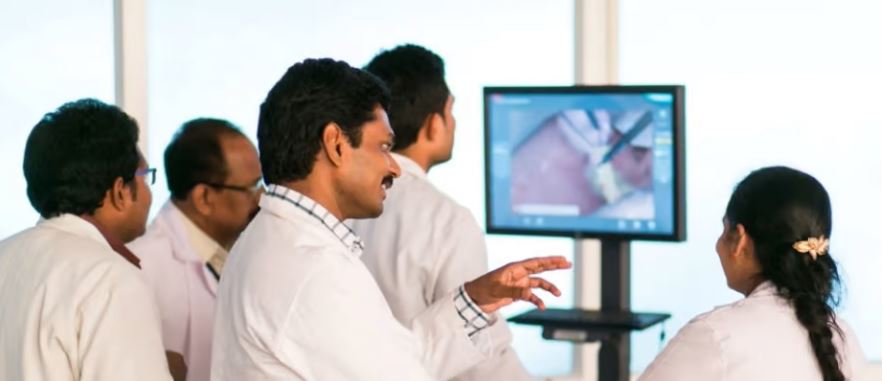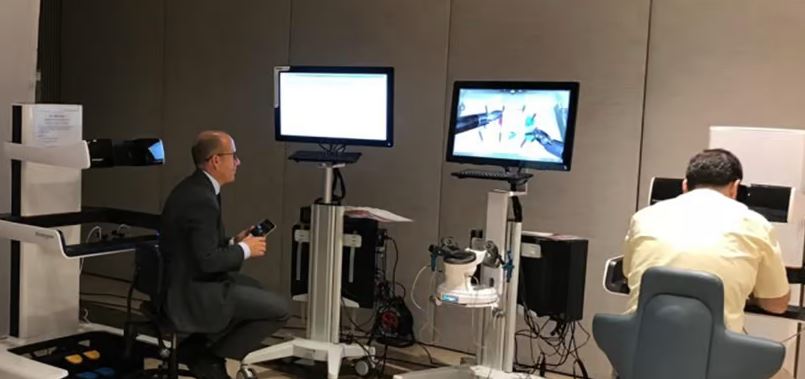下载PDF
Glasscock Texas ISD Installs Combination of Wireless and Wired Locks Managed by 3xLOGIC infinias Access Control
适用行业
- 教育
适用功能
- 设施管理
用例
- 周边安全与访问控制
服务
- 系统集成
挑战
Glasscock County ISD, a school district in Garden City, TX, wanted to enhance the security of its campus. The district comprises multiple buildings, including two campuses, an agriculture shop, cafeteria and concessions, two gyms, and a bus depot. The superintendent, Scott Bicknell, was inspired by a nearby school district's system of over 100 doors managed by the infinias system. The challenge was to secure all academic settings across the campus and prevent unauthorized entry during certain times.
关于客户
Glasscock County ISD is a school district located in Garden City, Texas. As of the 2018-2019 school year, it had 304 students. The district maintains multiple buildings, including two campuses that cater to students from pre-K through high school. Other facilities within the district include an agriculture shop, a cafeteria and concessions, two gyms, and a bus depot. The district is led by Superintendent Scott Bicknell, who is committed to enhancing the security of the school's facilities.
解决方案
VGI Technology proposed a three-phase access control installation, using a mix of wireless locks from Allegion and wired locks. The first phase of the project saw 60 exterior doors being fitted with both wireless and wired locks. The second phase involved the installation of over 70 Allegion wireless locks for internal classroom doors, managed by an existing 3xLOGIC infinias access control system. The ongoing third phase will complete the installation of all the wireless locks, bringing the total number of doors under management to 135. The main school building has three outer doors, and all visitors must be buzzed in by intercom. The exterior and interior doors are access card-based, and only staff and teachers are issued cards. The district maintains multiple user groups, each with different access privileges and times. Multiple staff members have the infinias application on their phones and can manage the system remotely at any time, from anywhere.
运营影响
数量效益
相关案例.

Case Study
IoT platform Enables Safety Solutions for U.S. School Districts
Designed to alert drivers when schoolchildren are present, especially in low-visibility conditions, school-zone flasher signals are typically updated manually at each school. The switching is based on the school calendar and manually changed when an unexpected early dismissal occurs, as in the case of a weather-event altering the normal schedule. The process to reprogram the flashers requires a significant effort by school district personnel to implement due to the large number of warning flashers installed across an entire school district.

Case Study
Revolutionizing Medical Training in India: GSL Smart Lab and the LAP Mentor
The GSL SMART Lab, a collective effort of the GSL College of Medicine and the GSL College of Nursing and Health Science, was facing a challenge in providing superior training to healthcare professionals. As clinical medicine was becoming more focused on patient safety and quality of care, the need for medical simulation to bridge the educational gap between the classroom and the clinical environment was becoming increasingly apparent. Dr. Sandeep Ganni, the director of the GSL SMART Lab, envisioned a world-class surgical and medical training center where physicians and healthcare professionals could learn skills through simulation training. He was looking for different simulators for different specialties to provide both basic and advanced simulation training. For laparoscopic surgery, he was interested in a high fidelity simulator that could provide basic surgical and suturing skills training for international accreditation as well as specific hands-on training in complex laparoscopic procedures for practicing physicians in India.

Case Study
Implementing Robotic Surgery Training Simulator for Enhanced Surgical Proficiency
Fundacio Puigvert, a leading European medical center specializing in Urology, Nephrology, and Andrology, faced a significant challenge in training its surgical residents. The institution recognized the need for a more standardized and comprehensive training curriculum, particularly in the area of robotic surgery. The challenge was underscored by two independent studies showing that less than 5% of residents in Italian and German residency programs could perform major or complex procedures by the end of their residency. The institution sought to establish a virtual reality simulation lab that would include endourological, laparoscopic, and robotic platforms. However, they needed a simulator that could replicate both the hardware and software of the robotic Da Vinci console used in the operating room, without being connected to the actual physical console. They also required a system that could provide both basic and advanced simulation training, and a metrics system to assess the proficiency of the trainees before they performed surgical procedures in the operating theater.

Case Study
Edinburgh Napier University streamlines long-distance learning with Cisco WebEX
• Geographically dispersed campus made in-person meetings costly and inconvenient.• Distance-learning programs in Malaysia, India, and China required dependable, user-friendly online tools to maximize interaction in collaborative workspaces.• Virtual learning environment required a separate sign-in process, resulting in a significant administrative burden for IT staff and limited adoption of collaboration technology.

Case Study
8x increased productivity with VKS
Before VKS, a teacher would spend a lot of time showing a group of 22 students how to build a set of stairs within a semester of 120 hours. Along with not leaving the teacher much time to provide one-on-one support for each student to properly learn carpentry, it also left a considerable amount of room for error. Key information would be misinterpreted or lost as the class was taught in the typical show-and-tell way.

Case Study
Scalable IoT Empowering GreenFlex's Sustainable Growth
GreenFlex, a company that supports sustainable development, decarbonization, and energy efficiency, faced several challenges in its quest to expand its business. The company needed to deploy a robust and sustainable IoT technology to support its growth. It was crucial for them to monitor and control devices at customer sites in a safe and reliable manner. They also needed to integrate devices across a range of communication protocols and gather and act on data to meet efficiency targets. GreenFlex had previously built IoT capabilities into its digital platform, GreenFlexIQ, to monitor and manage customer sites remotely. However, they soon realized that they needed a new platform to support their ambitions. They needed a platform that could scale to connect more devices for production management and make it easier for the operations team to manage devices in the field.





